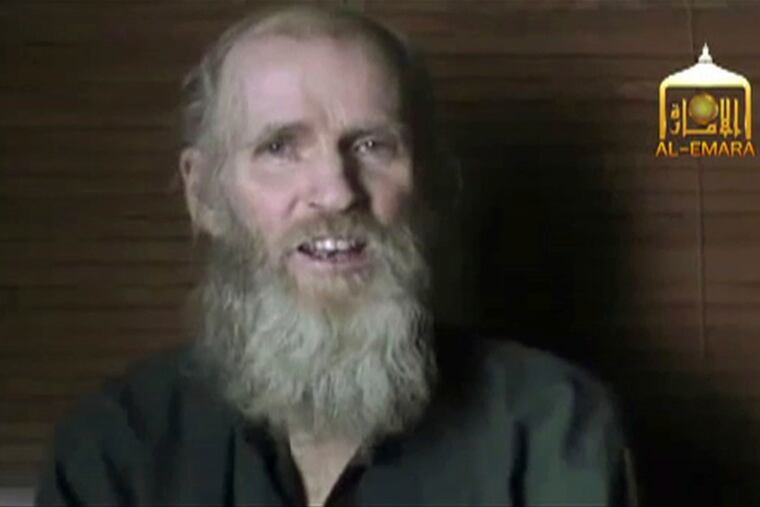Taliban says it has freed Philly-area native, Australian hostage in prisoner exchange
Kevin C. King, who was born in Norristown and raised in the Philadelphia suburbs, was abducted in 2016 outside the American University in Kabul along with an Australian colleague.

ISLAMABAD — The Taliban said they freed on Tuesday an American and an Australian hostage held since 2016 in exchange for three top Taliban figures who were released by the Kabul government and flown out of Afghanistan the previous day.
The hostages — American Kevin C. King, a Montgomery County native, and Australian Timothy J. Weeks — were released in southern Zabul province, ending their more than three years in captivity.
According to a Taliban official, who spoke on condition of anonymity because he wasn’t authorized to talk to the media, the release took place in the province’s Now Bahar district, a region largely under Taliban control.
It wasn’t immediately known if the two hostages, both professors at the American University of Kabul, were handed over to Afghan government representatives, intermediaries, or U.S. forces.
Their freedom came hours after the Afghan government freed three Taliban prisoners and sent them to Qatar. They included Anas Haqqani, the younger brother of the Taliban’s deputy Sirajuddin Haqqani, who also leads the fearsome Haqqani network.
It appears the Taliban had refused to hand over the two professors until they received proof their men had reached Qatar.
King, 63, was born in Norristown and raised in the Philadelphia suburbs, relatives told the New York Times. He attended the University of Miami and has since taught around the world, according to the Times.
Afghan President Ashraf Ghani a week ago announced the “conditional release” of the Taliban figures, saying at a press event broadcast live on state television that it was a very hard decision he felt he had to make in the interest of the Afghan people.
King and Weeks, the two captives held by the Taliban were abducted in 2016 outside the American University in Kabul. The following year, the Taliban released two videos showing the captives. A January 2017 video showed them appearing pale and gaunt. In the later video, King and Weeks looked healthier and said a deadline for their release was set for June 16 that year.
Both said they are being treated well by the Taliban but that they remain prisoners and appealed to their governments to help set them free. It was impossible to know whether they were forced to speak.
Subsequently, U.S. officials said that American forces had launched a rescue mission to free the two, but the captives were not found at the raided location.
U.S. Secretary of State Mike Pompeo and U.S. National Security Adviser Robert O’Brien made separate calls to Ghani on Monday to discuss the prisoners’ release, Ghani’s spokesman Sediq Sediqqi said.
The release and swap were intended to try to restart talks to end Afghanistan’s 18-year war and allow for the eventual withdrawal of U.S. troops from Afghanistan.
The United States had been close to an agreement in September with the Taliban but a fresh wave of violence in the Afghan capital that killed a U.S. soldier brought talks and an impending deal to a grinding halt.
The agreement called for direct talks between the Taliban and Afghan government as well as other prominent Afghans to find a negotiated end to the war and set out a roadmap for what a post -war Afghanistan would look like.
Ghani in his discussions with Pompeo and O’Brien said he wanted a reduction in violence and an all-out cease-fire, his spokesman said.
According to a U.S. State Department statement Tuesday, Pompeo told Ghani the United States was “committed to work closely together to address violence if the President’s decision does not produce the intended results.”
Associated Press writers Abdul Khaliq in Lashkar Gah, Afghanistan, and Tameem Akhgar in Kabul, Afghanistan, and staff writer Allison Steele contributed to this article.